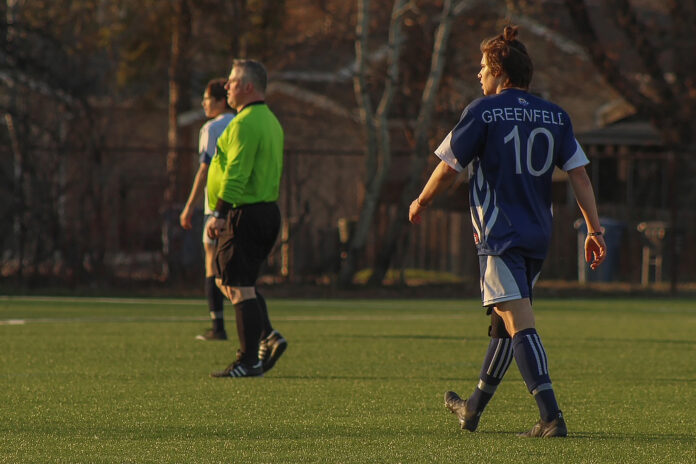The Selkirk Settler Times wishes you and your loved ones a very Happy Valentine’s Day.
Jets battle Senators on home ice

The Winnipeg Jets faced off against the visiting Ottawa Senators at BellMTS Place on the afternoon of Feb. 13, which was also dubbed Scotia Bank Hockey Day in Canada. But it wasn’t the outcome Winnipeg was hoping for, especially with the Jets out shooting the Senators 31 to 29.
After 60 minutes of play, the Jets lost a heart breaker 2-1.
The Jets took a 1-0 lead early in the second period with a goal by Mark Scheifele at 5:43 but Winnipeg’s lead was short lived as Ottawa tied the game less than two minutes later when Evgenii Dadonov lit the goal lamp at 7:29.
With just seconds remaining in the third frame the Senators scored the game winning goal when Brady Tkachuk beat Winnipeg’s goaltender Connor Hellebuyck at19:51.
The Jets travel to Edmonton next for a national Hockey League tilt against the Oilers on Feb. 15.
Province increasing funding to public school division for record high 2021-22 academic year
Submitted by the Province of Manitoba
Manitoba’s public schools system will see another increase in the Funding of Schools Program for the 2021-22 school year of $20.8 million, or 1.56 per cent, for a total $1.35 billion, the highest total investment in Manitoba’s history, Education Minister Cliff Cullen announced Feb. 5.
The increase includes $6.7 million, or a 0.5 per cent increase to base funding for public schools, and this year’s commitment includes an additional $5.5 million for special needs funding for school divisions, along with other grants. This special needs funding supports students with disabilities and with exceptional needs, providing student specific supports determined by school teams such as educational assistants or assistive technology.
“This announcement continues our commitment to the success of students by making record levels of annual investment in our student’s education while also keeping our students, teachers and staff safe,” said Cullen. “Our education system is one of the best funded in Canada, and parents need to know that our government will continue to support their children’s futures.”
Manitoba has the third-highest spending per student in Canada at $14,815, after Saskatchewan and New Brunswick.
The province committed that school divisions would not see their funding reduced due to enrolment variations because of COVID-19. The province will also continue to ensure all school divisions receive no less than 98 per cent of the operating funding they received a year earlier.
School divisions also raise revenue through local education property taxes. The Manitoba government will continue to support Manitobans by reducing the local property tax burden for ratepayers. School divisions will freeze their education property taxes and the province will provide a Property Tax Offset Grant equivalent to a two per cent property tax increase or $22.8 million. This is over and above the $20.8 million commitment for the Funding of Schools Program.
“The province remains committed to modernizing Manitoba’s education system to ensure our students are well prepared for whatever path they choose, whether it is post-secondary education, joining the workforce or staring their own business,” said Cullen. “Our students, parents and education staff need to know that regardless of the challenges we are facing, we will be there to support their educational needs and to ensure their children have the best opportunity for success.”
This annual funding commitment builds upon the previous announcement to support schools with the $185-million Safe Schools Funding for COVID-related expenses.
Alarming number of vehicle fires over the past two months: Manitoba Public Insurance
Submitted by Manitoba Public Insurance
Over the past two months, a total of 81 passenger vehicle-related fires have been opened with Manitoba Public Insurance. Nearly three dozen of these fires in December and January were directly related to the use of block heaters.
Disturbingly, some of these vehicle fires resulted in houses or carports also catching fire. Investigations discovered a number of these vehicle fires resulted from the use of interior car warmers and household interior heaters being used to warm vehicles in outdoor garages and carports.
Over the same two-month time frame in a normal year, passenger vehicle fires are typically half the numbers compared to 2021.
”Many of these fires could have been prevented. The use of an interior electric heater in an outdoor winter setting is extremely dangerous,” explained Paul Brisson, MPI Fire Investigator. “The issue is that moisture and overheating of the heater elements and internal components, which are not intended to be running continuously for extended periods of time especially outdoors in extreme cold, can cause the heater or power supply to fail.”
Interior home heaters used in conjunction with an extension cord causes excessive power draw and may overload a circuit or cause a failure in the extension cord, plugs, fuse panels, said Brisson.
“Block heaters are intended to be used in cold climates to warm an engine prior to starting the vehicle,” he said. “As a general rule, an engine block heater should be used when the temperature drops below -15 and greater. It’s strongly discouraged to plug in a vehicle which is parked in an attached garage.”
Preventative Steps
Block heater power cords and extension cords must be free of defects, cuts, dirt, and corrosion and should be stored properly to avoid damage which could lead to a fire.
Block heater power supply cords should be capped when not in use (if equipped), and be properly routed through the front grill or bumper area of a vehicle to avoid pinching or damage to the cord during winter months.
Do not drive over your extension cord. This could potentially crack the cord and result in electrical failure when plugged in.
It is recommended that block heater power supply and extension cords be plugged into a GFCI outlet rather than a standard electrical outlet. The GFCI (Ground Fault Circuit Interrupter) adds an additional layer of safety as it contains a sensor that monitors the flow of electricity current through the wires. When the GFCI sensor detects a variation from the normal current it shuts off the flow of electricity in the outlet and may prevent damage or fire caused by an electrical fault.
Greenfeld pursuing his dreams on soccer pitch

Despite the COVID-19 pandemic, Zack Greenfeld is keeping focused on the love his has for the game of soccer as he continues to pursue his dreams and looks ahead to the future.
The 18-year-old, who attends the University of Alberta on a soccer scholarship, is back in Manitoba due to the pandemic. He’s not take a break from his studies as he is simply studying remotely.
Greenfeld has split his time living in Selkirk with his mother and his father in Winnipeg. While he is living in Selkirk it provides him with the opportunity to be closer to where he trains at the Skylight in the RM of East St. Paul.
Full feature on Greenfeld coming soon.
New public health orders formalize next steps of province’s cautious reopening effective Feb. 12
Submitted by the Province of Manitoba
Following feedback from Manitobans and advice from public health leaders, the province is loosening a variety of restrictions while ensuring protocols are in place to protect Manitobans from the risks of COVID-19, Premier Brian Pallister and Dr. Brent Roussin, Manitoba’s chief provincial health officer, announced Feb. 9.
“Today is another big day for Manitobans, especially for our local business owners who are eager to safely reopen their doors, and provide the goods and services that Manitobans have missed the past few months,” said Pallister. “With fewer restrictions, we must remain cautious, in fact, even more cautious. In the absence of COVID-19 vaccines from the federal government, following the fundamentals is how we continue to protect each other and save lives.”
The orders will formalize the following changes for all of Manitoba, replacing the General COVID-19 Prevention Orders made on Jan. 28 and the Northern Manitoba COVID-19 Prevention Orders made on Feb. 1. The orders will take effect at 12:01 a.m. on Feb. 12 and will last for three weeks.
The orders include the following changes, with further pandemic safety measures in place:
• allowing restaurants and licensed premises to reopen at 25% capacity with patron groups limited to members of the same household only;
• allowing outdoor rinks to reopen for casual sports as well as organized practices and games, with multi-team tournaments not permitted;
• allowing gyms, fitness centres and yoga studios to reopen at 25% capacity;
• allowing indoor sporting facilities such as rinks, gymnastic clubs and martial arts studios to reopen at 25% capacity for individual instruction only;
• allowing places of worship to hold regular religious services if a service does not exceed 10% of usual capacity or 50 people, whichever is lower;
• allowing self-help groups for persons dealing with addictions or other behaviours to hold meetings at 25%capacity of the premise where meetings take place;
• allowing museums, art galleries and libraries to operate at 25% capacity;
• allowing personal service businesses, such as those providing pedicures, electrolysis, cosmetic application, tanning, tattooing or massage services to reopen at 25% capacity;
• allowing photographers and videographers to offer services to individual clients or those residing in the same household in addition to providing services at weddings, with the exception of visiting client homes; and
• allowing the film industry to operate fully with physical distancing and other safety measures in place.
“These new orders allow us to resume more activities and services we enjoy, but we cannot let our guard down yet,” said Roussin. “We will continue to carefully monitor COVID-19 developments and case numbers to ensure we protect each other and our health-care system. Manitobans need to continue to follow the fundamentals at all times including staying home when sick, frequent handwashing and wearing masks. We all have a part to play in keeping our COVID-19 curve down so we can continue making measured progress towards getting back to the things we love.”
The new orders also bring the entire province under the same restrictions, where the northern region had previously been under separate orders to curb the spread of COVID-19 in the region.
Under the new orders, northern Manitoba will see the changes listed above in addition to the restrictions in place over the last three weeks for the rest of the province including:
• household visitor restrictions of up to two designated people,
• visits of five people plus members of a household on an outdoor private property,
• retail stores open at 25% capacity or 250 people maximum with adequate physical distancing, and
• non-regulated health services, hair salons and barbershops open with 25% capacity and adequate physical distancing.
Since Feb. 4, over 33,000 responses were provided on the proposed changes to the orders. Feedback indicated:
• 65% of respondents felt somewhat or very comfortable going to restaurants;
• 57% of respondents felt somewhat or very comfortable going to the gym or to a yoga studio; and
• opening food services was ranked the highest priority for respondents, followed by opening personal services like nail salons and tattoo parlors, allowing gyms to reopen for individual training and allowing outdoor organized outdoor sports to resume for games or practices.
Final survey results will be posted on the EngageMB website once compiled.
For up-to-date information on COVID-19 in Manitoba, visit www.manitoba.ca/COVID19.
Province funding school infrastructure projects in Selkirk, St. Andrews
Submitted by Manitoba PC Caucus
Alan Lagimodiere, MLA for Selkirk is pleased to highlight a recent provincial announcement to invest an additional $50 million in capital investments in schools across the province, including a number of critical projects in schools in Selkirk and St. Andrews.
“Our PC government is committed to enhancing our education facilities for all students to support our pledge to protect Manitobans,” Lagimodiere said. “These much-needed projects will provide substantial upgrades and repairs to schools in our community to best fulfill the needs of students and teachers.”
The following projects and repairs have been approved in Selkirk and St. Andrews:
• Selkirk Junior High School: Boiler System Replacement
• Robert Smith Elementary School: Foundation Levelling
• St. Andrews School Lift Projects are planned to be completed within a time frame of six to 24 months following the award of tenders and start of construction.
The Manitoba government is investing a total of $210 million in crucial K to 12 school capital projects to enhance learning environments for students and teachers across the province.
Selkirk considers repatriating land-use planning from Red River Planning District
Submitted by the City of Selkirk
Since 1977 the land-use planning and building permitting in the City of Selkirk has been under the administration of the Red River Planning District. Over the past decade, the city has found this structure no longer meets the expectations of council or the needs of local citizens, businesses and developers. A recently completed study into the feasibility of taking back the administration of these services has found that establishing a new city planning office would save tax dollars and better align the services to the needs of Selkirk.
Mayor Larry Johannson said that it may be time for the city to take back the administration of these functions to better meet the needs of the growing city.
“Selkirk is a growing urban center. We have seen lots of change since the 1970’s when the planning district was first established. We hear lots of feedback, often concerns from citizens and developers about planning services. We think that we are just at that stage of our development as a city to do our own planning and permitting,” Johannson said.
The Red River Planning District is incorporated under the Manitoba Planning Act and the process for amending its membership is prescribed in the Act. Prior to making the formal request to the Minister of Municipal Relations to be removed from the district, the city must first hold a public hearing to present the findings of the study and to seek citizen input.
Johannson said that the process allows citizens to share their thoughts on leaving the district and offering services directly.
“Ultimately Minister Johnson will decide whether Selkirk can set up its own planning office, but this process gives citizens a chance to put on record some of the concerns they have shared with us over the years. I truly think that once the Minister sees the support from citizens and the value this will bring to our city, he will be supportive. It makes a lot of sense for a city of our maturity,” Johannson said.
Selkirk CAO Duane Nicol says establishing an independent planning office would fulfill a key part of the City’s strategic plan. Under the ‘maximum value from community resources’ piler the plan says, “Council may need to explore other approaches (to regional development processes) that could be more effective and equitable for the people of Selkirk”.
“Finding more effective regional development approaches is one of the 21 strategic objectives in the plan. This would also support the achievement of other objectives including ‘taking firmer control of our economic destiny’ and having ‘clear intentions for future development’,” Nicol said.
Nicol says that by bringing planning services in-house, the city would be able to better align these services with the city’s sustainable economic development goals as well as align planning decisions with the city’s asset management program.
“Development has a huge impact on infrastructure. Creating new roads and pipes comes at a cost. By repatriating planning services, we can ensure that new development is aligned with our infrastructure capacity and we encourage new growth that makes us more financially sustainable, not less.”
The feasibility study was conducted by Way-To-Go Consulting, a Manitoba-based independent consulting firm that specializes in municipal government. Nicol said it was important to bring in experts to conduct the study to ensure council had high quality, and unbiased information on which to make a decision.
The study reviews the planning services offered by other Manitoba cities and proposes a structure and operating model for the city. Using this information, the study determines expense projections and then uses actual permit and service data for Selkirk to project revenues. Based on this evaluation, an independent planning office could save Selkirk taxpayers over $60,000 in its first year of operations.
“Under this new model, we expect to see a very large savings for citizens. So not only will we see more alignment between our sustainable economic development goals, our asset management program, and our land use planning, but we’ll find savings as well,” said Nicol.
While leaving the district would allow the city to focus on the services provided to local property owners, Nicol says the city would still approach land-use planning from a regional perspective.
“Selkirk is a regional hub. We have good relationships with our neighbouring communities, and we will continue to work with them to ensure land uses and other services consider the impacts on citizens regardless of municipal boundary. While in the near future we might not be part of RRPD, we will still be working with them regularly for mutual benefit and our development plan will have to fit within the regional context. Not much will change from that perspective,” said Nicol
Citizens, developers, and businesses are invited to view or participate in the public hearing that will be held on March 23rd. Due to COVID restrictions, the public hearing will be conducted virtually. Any interested party must first register to receive an invite to the hearing with instructions. To register, interested parties must visit www.MySelkirk.ca/RRPDhearing. For those seeking to participate but do not have internet access, the city asks that you call CitizenSupport at 204-785-4900 where alternate arrangements may be made.
Thoughts on Valentine’s Day and marriage

Recently, I heard of a fellow who, when asked by his uncle what he had bought his wife for Valentine’s Day, said, “A belt and a bag.” His uncle replied, “That was very nice of you! I hope she appreciates the thought.” “So do I,” said the nephew. “Hopefully, the vacuum cleaner will work a lot better now.”
I love Valentine’s Day. For me, it gives me another chance to express to my wife how much I love her. I look forward to buying her things she likes (but not vacuum cleaner belts and bags…)
But, at the same time, I realize not everybody’s marriage is filled with love. For example, comedian Red Skelton tells of some of the challenges he has faced in his marriage over the years: “I married Miss Right. I just didn’t know her first name was Always.” He went on to say, “I haven’t spoken to my wife in 18 months. I don’t like to interrupt her.”
Once he asked his wife where she wanted to go for their anniversary. “Somewhere I haven’t been in a long time,” she replied. “So,” he says, “I suggested the kitchen.”
“Two times a week, we go to a nice restaurant, have a little beverage, good food and companionship. She goes on Tuesdays, I go on Fridays. We also sleep in separate beds. Hers is in California and mine is in Texas.” Actually, you should know the Skelton’s do have a wonderful marriage.
I see part on my job as a pastor being to help people have successful relationships and happy marriages. This is one of the reasons why a few years ago, I wrote the book, Knot Happy – how your marriage can be, that was published by Tate Publishing. In it, I pointed out the Bible’s teachings on marriage: how a husband and a wife are to respond to each other. I wrote, “I believe the key to being happy though married is to understand and apply God’s prescriptions for marriage as laid down in the scriptures.”
Here are those prescriptions. First, here is what God wants from husbands: “Husbands, love your wives just as Christ loved the church and gave Himself up for her” (Ephesians 5:25). I am to love my wife to the point I would be willing to die for her (that’s how much Jesus loved me and every other person in the church.) A husband sacrificially lays down his life for his wife; he loses himself for her. Even when it is difficult, he still does it. Like a potter feels around the rim of the goblet he has just fashioned to see if there are any cracks in it, so a good husband feels around the edges of his wife’s soul and tries to discover what unmet needs there are in her life. Then he goes out and does his level best to see they are met.
And here is what God wants from wives: “The wife must respect her husband” (Ephesians 5:32.) Most men desire, even more than love, the respect and admiration of the woman they have married. When a wife lets her husband know she is proud of him and that she admires him above all other men, it gives him the emotional fuel he needs to carry on. A number of years ago, I was at a conference where a missionary couple gave a report. As the husband spoke, the wife stood by his side, looking at him with eyes filled with admiration. To this day, I recall how deeply that stirred me as I watched. Every man wants to be greatly admired by the love of his life.
If you are married, I hope this Valentine’s and even beyond, there will be lots and lots of love and respect happening in your marriage.
Happy Valentine’s Day.





